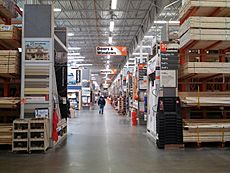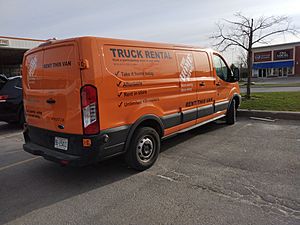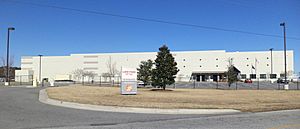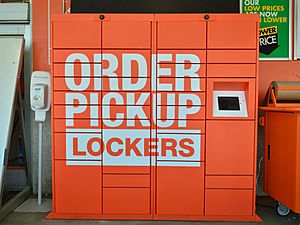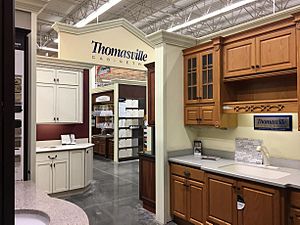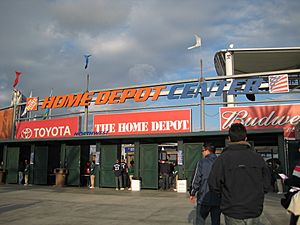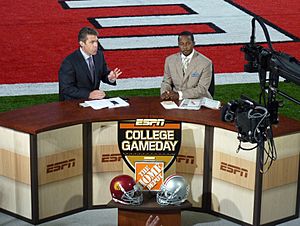Home Depot facts for kids
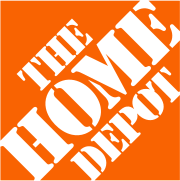 |
|
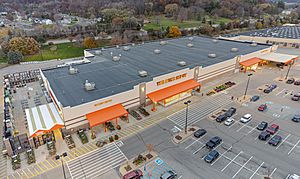
A Home Depot in Onalaska, Wisconsin
|
|
| Public | |
| Traded as | |
| Industry | Retail (home improvement) |
| Founded | February 6, 1978 in Marietta, Georgia, U.S. |
| Founders |
|
| Headquarters |
Unincorporated Cobb County, Georgia
,
U.S.
|
|
Number of locations
|
2,347 (2025) |
|
Areas served
|
|
|
Key people
|
Ted Decker (chairman, president & CEO) |
| Products | Home appliances, tools, hardware, builders hardware, lumber, building materials, lighting, electrical supplies, paint, plumbing, flooring, furniture, home decor, bedding, curtains, garden supplies and plants |
| Revenue | |
|
Operating income
|
|
| Total assets | |
| Total equity | |
|
Number of employees
|
470,100 (2025) |
| Subsidiaries |
|
The Home Depot, Inc., often called Home Depot, is a huge American company that sells things for home improvement. They offer tools, building materials, appliances, and even services like renting trucks. Home Depot is the biggest home improvement store in the United States. In 2021, the company had over 490,000 employees and made more than $151 billion in sales. Its main office is in Cobb County, Georgia.
Home Depot has many large stores across the United States, including places like Puerto Rico and the United States Virgin Islands. They also have stores in all 10 provinces of Canada and all 32 states of Mexico. The company also owns Interline Brands, which is now called The Home Depot Pro. This part of the company has 70 distribution centers across the U.S. Home Depot is one of the largest employers in the United States.
Contents
History of Home Depot
Starting the Company (1978–1999)
The Home Depot was started in 1978 by five people: Bernard Marcus, Arthur Blank, Ron Brill, Pat Farrah, and Ken Langone. Their idea was to create very large home improvement stores, much bigger than any others. Ken Langone, an investment banker, helped Marcus and Blank get the money they needed to start.

The first two Home Depot stores opened on June 22, 1979, in metro Atlanta. These stores were in buildings that used to be large discount stores. On September 22, 1981, The Home Depot became a public company, which means its shares could be bought and sold by anyone. This helped them raise over $4 million. They joined the New York Stock Exchange on April 19, 1984.
Home Depot started to grow outside of Georgia, opening stores in Florida in 1981. By 1984, they had 19 stores and sales of over $256 million. To expand into the Dallas area, Home Depot bought another company called Bowater Home Center in 1984. This fast growth in the mid-1980s caused some money problems for Home Depot. To fix this, they opened fewer new stores in 1986 and sold more shares to raise money.
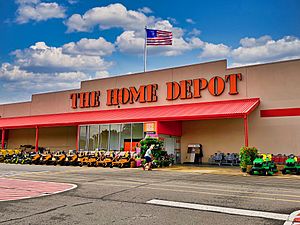
In 1989, The Home Depot became the biggest home improvement store in the United States, passing Lowe's. In the 1990s, Home Depot looked for new ways to serve customers. They launched EXPO Design Center in 1991, which offered fancy products and design help. They also published a 480-page book called Home Improvement 1-2-3 in 1995.
In 1994, Home Depot bought a Canadian hardware chain called Aikenhead's Hardware. All of these stores were later changed into Home Depot stores. By 1995, Home Depot's sales reached $10 billion, and they had 350 stores.
In 2000, Robert Nardelli, a former executive from General Electric, became the CEO and president of The Home Depot.
Growth and Changes (2000–2007)
Home Depot bought Maintenance Warehouse in 1997, a company that sold repair supplies by mail. They also bought Apex Supply in 1999, which sold plumbing and heating supplies. These companies were later combined and renamed "The Home Depot Supply" in 2004.
In 2004, employees at a Home Depot store in Michigan voted against joining a labor union. If they had joined, it would have been the first Home Depot store with union workers.
In 2001, Home Depot bought Your Other Warehouse, a large plumbing supplier. The EXPO Design Center division was also reorganized that year.
The Home Depot entered the Mexican market in 2002 by buying a home improvement chain called Del Norte. They also started building new stores in Mexico. In the same year, they launched Home Depot Landscape Supply, which focused on plants and supplies for professional landscapers. However, this idea only lasted five years, and all Home Depot Landscape Supply stores closed in late 2007.
In September 2005, Home Depot started selling home furnishings online with "10 Crescent Lane." Soon after, they launched "Paces Trading Company" for lighting. In 2006, they bought Home Decorators Collection, adding it to their online sales.
In 2006, Home Depot bought Hughes Supply, the largest home construction wholesaler in the U.S., for $3.2 billion. Hughes Supply became part of The Home Depot Supply to better serve business customers. The Home Depot Supply was renamed HD Supply in January 2007. Five months later, Home Depot sold HD Supply to a group of three investment firms.
Recent Years (2007–Present)
On January 2, 2007, Robert Nardelli stepped down as CEO after six years. People had complained about his management style and his very high pay, especially since the company's stock wasn't doing well compared to its competitor, Lowe's. His replacement, Frank Blake, had a more modest pay package that depended on the company's success. Blake changed many of Nardelli's strategies.
In 2008 and 2009, during a tough time for the housing market, Home Depot announced they would lay off thousands of employees and close 54 stores, including all the EXPO Design Centers. Employees from EXPO could apply for other jobs at Home Depot. By February 2009, sales had dropped to $71.288 billion. In 2012, Home Depot closed its large stores in China, but kept smaller stores that focused on special products and customer service.
In 2013, The Home Depot opened two large distribution centers in Atlanta and Los Angeles.
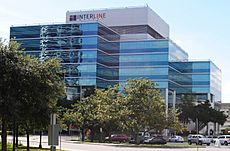
In August 2014, Frank Blake announced he would step down as CEO. Craig Menear took over on November 1, 2014. Menear had worked at Home Depot since 1997 in many different roles.
In September 2014, the company had a data breach, meaning some customer credit card information was stolen. Home Depot offered free credit monitoring to affected customers.
On July 22, 2015, Home Depot bought Interline Brands for $1.6 billion. Interline Brands became fully part of The Home Depot in August 2016.
In 2017, Home Depot bought the online part of The Company Store, which sells home decor items. The Company Store was founded in 1911.
In December 2020, Home Depot bought back HD Supply for $8 billion.
In January 2022, The Home Depot announced that Craig Menear would step down as CEO and president on March 1, 2022. Ted Decker took his place.
In February 2023, Home Depot announced it would spend $1 billion to increase the hourly pay for its employees.
Home Depot's Money Matters
| Year | Revenue in million USD$ |
Net Income in million USD$ |
Price per Share in USD$ |
Employees | Stores |
|---|---|---|---|---|---|
| 2005 | 73,094 | 5,001 | 25.46 | 325,000 | 1,890 |
| 2006 | 77,019 | 5,838 | 24.59 | 345,000 | 2,042 |
| 2007 | 79,022 | 5,761 | 23.70 | 364,000 | 2,147 |
| 2008 | 77,349 | 4,395 | 17.36 | 331,000 | 2,234 |
| 2009 | 71,288 | 2,260 | 17.61 | 322,000 | 2,233 |
| 2010 | 66,176 | 2,661 | 22.70 | 317,000 | 2,244 |
| 2011 | 67,997 | 3,338 | 27.06 | 321,000 | 2,248 |
| 2012 | 70,395 | 3,883 | 41.22 | 331,000 | 2,252 |
| 2013 | 74,754 | 4,535 | 58.48 | 340,000 | 2,256 |
| 2014 | 78,812 | 5,385 | 68.55 | 365,000 | 2,263 |
| 2015 | 83,176 | 6,345 | 95.33 | 371,000 | 2,269 |
| 2016 | 88,519 | 7,009 | 108.50 | 385,000 | 2,274 |
| 2017 | 94,595 | 7,957 | 132.80 | 406,000 | 2,278 |
| 2018 | 100,904 | 8,630 | 164.89 | 413,000 | 2,284 |
| 2019 | 108,203 | 11,121 | 185.68 | 413,000 | 2,291 |
| 2020 | 110,225 | 11,242 | 228.67 | 415,000 | 2,296 |
| 2021 | 132,110 | 12,866 | 306.72 | 504,800 | 2,317 |
| 2022 | 151,157 | 16,433 | 297.81 | 490,600 | 2,322 |
| 2023 | 157,403 | 17,105 | 303.98 | 518,100 |
As of 2020, Home Depot was ranked #26 on the Fortune 500 list of largest U.S. companies by total sales. In 2023, it was ranked 67th in the Forbes Global 2000 list of top companies worldwide.
In the second quarter of 2020, the company reported sales of $38.1 billion. This was a big increase from the year before. The money they earned (net earnings) also went up by 27% to $4.3 billion. This growth happened because many Americans were staying home during the COVID-19 pandemic and working on home projects. In the third quarter of 2020, Home Depot's sales were $33.5 billion, which was a 24% increase from the previous year.
Home Depot's Mascot
Home Depot's mascot is named Homer D. Poe. He has been used in advertising since 1981. The person who drew him, Gwyn Raker, said she wanted him to be a friendly, funny neighbor. There's even a charity for Home Depot employees called The Homer Fund, named after the mascot. Homer is a big part of Home Depot's culture, appearing on signs, awards, and even as a life-size costume for stores. Homer also has a wife named Daisy.
How Home Depot Works
Home Depot stores are usually very large, about 105,000 square feet. They are set up like warehouses and stock a huge variety of supplies. The company's main color is a bright orange, which you can see on their signs, equipment, and employee aprons.
Serving Contractors
Even though contractors are only a small percentage of Home Depot's customers, they account for 45% of the company's annual sales. To help these contractors, Home Depot is building new distribution centers. These centers are designed to make it easier for builders to pick up supplies with their large trucks.
Marketing and Slogans
On December 5, 2019, The Home Depot announced its new slogan: "How Doers Get More Done." This replaced "More saving. More doing." which had been used since 2009. Before that, their slogan was "You can do it. We can help." from 2003. Other slogans from the past include "The Home Depot, Low prices are just the beginning" and "The Home Depot: First In Home Improvement!"
US Stores Leadership
In 2014, Marc Powers became the head of Home Depot's U.S. stores. He was replaced by Ann-Marie Campbell on February 1, 2016. Ms. Campbell has worked for Home Depot for over 30 years, starting as a cashier.
Distribution Centers
The Home Depot has over 90 distribution centers across the United States. These centers help supply the more than 2,000 Home Depot stores.
Online Shopping
The Home Depot's website, homedepot.com, gets over 120 million visitors each year. They have call centers in several U.S. cities to help online customers. Home Depot online offers options like picking up your order in the store and returning items bought online.
Tool and Equipment Rental
Most Home Depot locations offer tools, vehicles, and equipment for rent. You can rent flatbed trucks, cargo vans, and box trucks. They also have professional-quality construction, landscaping, and household equipment. Rentals are available for 4 hours, daily, weekly, or monthly.
Other Companies and Brands Home Depot Owns
Companies Home Depot Owns
Blinds.com
Blinds.com is an online store that sells window blinds and coverings. It was started by Jay Steinfeld in 1993. In January 2014, The Home Depot bought Blinds.com.
Compact Power Equipment Inc.
This company rents out power equipment. Before 2017, it provided equipment to over 1,000 Home Depot rental departments. The Home Depot bought this company on July 6, 2017.
Interline Brands
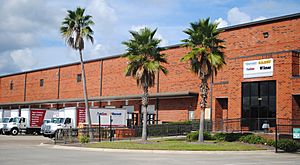
Interline Brands, renamed The Home Depot Pro in 2018, has over 90 distribution centers. They provide supplies for maintenance, repair, and operations (MRO) to customers in the U.S., Canada, and Puerto Rico.
Some of the brands under Interline Brands include:
- Wilmar Industries
- Barnett
- Maintenance USA
- SupplyWorks
- US Lock
- Hardware Express
- Leran Gas Products
The Company Store
This is an online seller of home decor items like textiles. It was founded in 1911. Home Depot bought only its online business in 2017.
Redbeacon
This was an online service that helped people find contractors. It was started in 2009 and is now called THD Pro Referral.
HD Supply
HD Supply is a company that provides industrial supplies and distribution services. It used to be called The Maintenance Warehouse. Home Depot bought HD Supply back in December 2020.
Brands Only at Home Depot
The Home Depot sells several well-known brands that you can't find at other stores, such as:
- Chem-Dry (for carpet cleaning)
- Behr paints
- Homelite (outdoor and power tools)
- Martha Stewart Living Omnimedia (outdoor furniture)
- Ryobi and Ridgid (power tools)
- American Woodmark cabinetry
- Thomasville Furniture Industries cabinetry
Home Depot's Own Brands
Home Depot also has its own brands, even though they don't make the products themselves. These include:
- Commercial Electric
- Glacier Bay (kitchen sinks, faucets)
- Hampton Bay (ceiling fans, outdoor furniture)
- HDX (a lower-cost brand started in 2012)
- Home Decorators Collection
- Husky (tools)
- Everbilt
Home Depot's Community Involvement
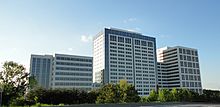
Who Owns Home Depot
Most of Home Depot's shares (about 70%) are owned by large investment groups. The biggest shareholders in December 2023 included The Vanguard Group and BlackRock.
Helping Others
The Home Depot Foundation is the company's charity, started in 2002. It has given over $200 million in money, time, and supplies to various causes. These include Habitat for Humanity and building playgrounds with KaBOOM! Home Depot also supports the U.S. Military by offering a 10% discount. Since 1993, their "Team Depot" program has given money to groups that help veterans and has employees volunteer to assist veterans.
Home Depot has worked with the Georgia Emergency Management Agency to help prepare children in Georgia for emergencies. They provided ready kits and prizes for a contest for elementary school students.
In March 2018, the company gave $50 million to train 20,000 people to become construction workers over the next ten years. This money helps train veterans, high school students, and young people in need. It helps address the shortage of construction workers.
Caring for the Environment
The Home Depot says it is committed to showing that sustainable business practices are good for business. In 2007, Home Depot added a special label to nearly 3,000 products. This label promotes saving energy, using wood from sustainable forests, and keeping water clean. Home Depot believes that as the world's largest buyer of construction materials, they can encourage suppliers and customers to be more environmentally friendly.
Home Depot also promotes compact fluorescent light bulbs in its stores. They created the largest recycling program in the United States for these bulbs. However, in March 2013, Home Depot stores in Canada stopped accepting them for recycling.
Television Shows
In 2002, The Home Depot became a sponsor for the PBS shows This Old House and Ask This Old House. In 2003, they also became a sponsor for Trading Spaces.
Sports Sponsorships
Arthur Blank, one of Home Depot's founders, bought the Atlanta Falcons football team in 2002. He also started a soccer team, Atlanta United FC, in 2014. Home Depot became involved with the Falcons in April 2017 when they got the naming rights for the park next to Mercedes-Benz Stadium. This park, called The Home Depot Backyard, is used for parking and tailgating during games and as a public green space on other days. The Home Depot is also a sponsor of the 2026 FIFA World Cup.
Since 1991, the company has supported sports, sponsoring the U.S. and Canadian Olympic teams. They even had a program that offered jobs to athletes that fit their training schedules. Home Depot stopped sponsoring the Canadian Olympic Team in 2005 and the U.S. Olympic team in 2009.
The Home Depot was a big sponsor for Joe Gibbs Racing in NASCAR from 1999 to 2014. They sponsored the No. 20 car driven by Tony Stewart and later Joey Logano. The company ended its NASCAR sponsorship after 2014.
The Home Depot was the main sponsor for The Home Depot Center in Carson, California, from 2003 to 2013. This stadium was home to the Los Angeles Galaxy soccer team. It is now called Dignity Health Sports Park.
In 2006, The Home Depot worked with Duke University to create "The Home Depot Smart Home." This is a special house where engineering students live and work to find new ideas for homes, like better security, communication, and energy use.
In January 2007, The Home Depot became the official home improvement sponsor of ESPN's College Gameday.
Home Depot Around the World
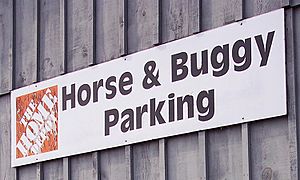
Canada
Home Depot Canada is the company's Canadian branch and a top home improvement store there. It has 182 stores and employs over 28,000 people in Canada. The Canadian head office is in Toronto.
Home Depot entered Canada by buying Aikenhead's Hardware. They planned to become bigger than their main competitor, RONA. In 2016, Lowe's bought RONA, making it a much larger competitor. In 2022, Lowe's announced it would sell its Canadian operations, including RONA.
In Quebec, where they have 22 stores, the company is simply called Home Depot.
Mexico
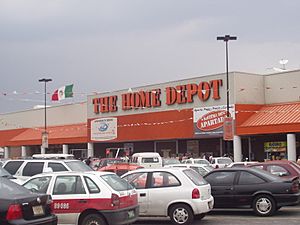
The Home Depot has 140 stores in Mexico and employs over 18,000 people as of early 2025. They became a major retailer in Mexico after entering the market in 2001. In 2004, they grew by buying Home Mart, which was the second-largest home improvement store in Mexico.
In February 2025, The Home Depot announced it would invest $1.3 billion in Mexico over the next three years. They plan to open five new stores each year and create 12,000 jobs.
China
In December 2006, The Home Depot bought a Chinese home improvement company called The Home Way. This gave Home Depot 12 stores in China right away.
However, Home Depot struggled in China. In April 2011, they closed their last store in Beijing. By September 2012, The Home Depot announced it was closing all its large stores in China. They kept only two smaller specialty stores.
The Home Depot's lack of success in China was because Chinese people prefer to have others do home improvement work for them, rather than doing it themselves. Home Depot realized they had misunderstood the "do-it-yourself" culture in China.
South America
In 1993, Home Depot opened a store in Peru, but it closed the next year due to low sales. In 1997, Home Depot entered Chile and Argentina. However, these ventures were not profitable. In 2001, their Chilean partners bought out Home Depot's share and renamed the stores. In 2002, Argentine Home Depot stores were bought by a Chilean company and renamed Easy stores.
See also
 In Spanish: The Home Depot para niños
In Spanish: The Home Depot para niños
- Menards, another home improvement store chain in the Midwestern United States.
 | Calvin Brent |
 | Walter T. Bailey |
 | Martha Cassell Thompson |
 | Alberta Jeannette Cassell |


